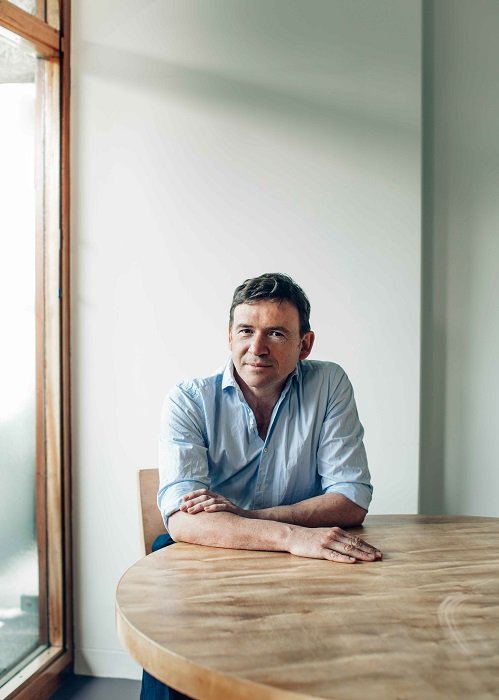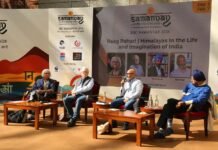Correspondent Priyanka Tanwar had a conversation with bestselling British novelist and screenwriter David Nicholls during the Jaipur Literature Festival 2025 about his latest work You Are Here, his best selling novel One Day, how his experience as an actor and screenwriter impacts his writing, sources of inspiration for his books, the kind of research that goes into romance writing, and much more.
Edited excerpts:
Indian Printer & Publisher (IPP) – You started as a screenwriter. How does your experience as a screenwriter impact your fiction writing?
David Nicholls – There are two main differences between screenwriting and fiction writing. One is planning – when you write a screenplay, there is a lot of thought about structure, action, and the shape of the story. I am always made to write endless synopses. You always start a screenplay with a breakdown of the story. And that was the approach I brought to writing fiction.
I tend to plan the novels quite intricately before I start writing. A lot of fiction writers are much more like poets – they improvise, see, explore, and discover as they go along. But because I was trained as a screenwriter, I like to make sure I know the whole thing. As a screenwriter, I always liked writing dialogue, and that’s something that I brought with me into fiction. I’m always happiest when the characters are speaking. That’s something that I love and I definitely took from screenwriting.
I like to write fiction with a sense of performance – I like the idea that the reader can see the rhythm of a scene – that the jokes work, that there’s tension and subtext and all of those things. Before I was a screenwriter, I was an actor and not a very good one, but I loved the whole business of the difference between what we say and what we mean. And that’s something I try to put on the page as well.
The biggest difference in screenwriting is a fight. Screenwriting is a lot of debate, a lot of friction with your colleagues, a lot of cutting, throwing things away. Whereas with fiction, you have terrific power – You’re pretty much the main voice and that’s great. I love screenwriting, but it’s very stressful. I do definitely like writing dialogue and I don’t like the idea of getting halfway through a novel and not knowing where it’s going. I like to think that everything is there for a purpose to move the story forward. I read a lot of fiction that’s much more improvised, that’s clearly much less thought through and carefully structured. And that can be wonderful, too. Fiction doesn’t have to feel like a movie. It doesn’t have to follow those shapes and patterns.
IPP – How did you become a romance novelist? Tell us about your journey.
David Nicholls – When I started writing fiction, I didn’t really think of myself as a romance novelist but there’s a love story element in all of my novels.
My first novel (Starter for Ten), for instance, is much more about class and education than it is about falling in love. And likewise, the second novel (The Understudy) is much more about failure and disappointment than it is about falling in love. You write what interests you and what preoccupies you.
The complexity of human relationships, particularly romantic relationships, has always interested me. I’m also very interested in how that changes at different stages of our lives. There isn’t a single kind of love story. There are all these varieties and that’s something that I love to explore. I like writing books that are comic, which make the reader laugh out loud. But I also like emotion in there. And what could be happier and sadder than a love affair? That source material allows me to write in a variety of tones, which I really enjoy.
IPP – Where do you find inspiration for your stories?
David Nicholls – Lots of different places. They’re very rarely autobiographical. Often, I will find something in my own life that I enjoy. For instance, with this last novel (You Are Here), walking in the English countryside was something that I was obsessed with and still am. But I don’t want to write anything too personal or too autobiographical.
I take the themes and apply them to characters and stories that I conjure up. And I’m very influenced by film and television. I’m very influenced by other novels. I read as much as I can. And often I’ll read a novel and think I’d love to write something like this. I’m very influenced by other writers. I’m interested in how we change as we get older and what becoming a parent does to us or what the end of a relationship feels like. Often, there’ll be the germ of something in my own life that’s transformed into fiction. I’m very careful not to write too directly from life. Often, that’ll be the catalyst, but everything after that is fictional; it’s made up.
IPP – Would you like to talk about your latest book, You Are Here?
David Nicholls – The latest book is another love story. This is about love in the middle of life. It’s about two people who feel that maybe they’re not going to have another relationship, and that part of their life is over. And they’re not unhappy about that. Certainly, Marne, the female character, isn’t unhappy about that. She’s got used to living by herself. She’s very content. She’s very respected in her work. She’s happy to have said goodbye to the idea of a serious relationship. And Michael, the male character, is reeling from the end of a marriage and is again happy, can’t even begin to think of starting a new relationship. They’re brought together, in Marne’s case, slightly against her will, on a long walk.
As a writer, if I ever get stuck, I go for a walk. It’s my way of finding inspiration and space to think. I wanted to write about this experience. I like the idea of bringing together two characters on a long walk and treating the walk as a kind of map of their relationship. Each day of the walk represents a different stage of their relationship – from indifference through hostility, through flirtation, through openness. The origins really came from my own experience of going on these long walks in the English countryside.
The walk Marne and Michael end up making is a walk I’ve done myself, right across the north of England. It takes about 11 or 12 days usually. It’s a very beautiful walk, quite a demanding walk, often quite a boring walk. I like the idea of putting characters into a particular space and seeing how they get on. It’s a kind of character sketch. It’s a chamber piece.
It’s not a big social novel. It’s close-ups. It’s about the very precise details of two people getting to know each other. I really loved writing this one. It’s partly because I love this walk and I loved doing the research. I, obviously, had to trace the characters’ steps to make sure it was accurate. And that was a great experience. But I also loved writing Michael and Marne – I love their wit, their playfulness and the melancholy that they keep to themselves for the most part. It was a real joy to write.
IPP – Tell us about the process of creating a believable bond between the two main characters.
David Nicholls – That’s a good question. For me, I spend a long time, up to a year, really doing the equivalent of doodling. I write a lot of stuff that I don’t use. I write a lot of stuff that’s just really to get the characters clear in my head. I write a lot of dialogue, a lot of ideas for scenes and biographical sketches. It’s a little bit analogous to an actor preparing a role. You ask yourself all kinds of questions about their background, how they would react in certain circumstances, their tastes, the way they dress, and their physicality. Only when I can answer all of those questions do I start writing the novel. That way, I feel like I can pretty much write about them in any situation that comes up.
Again, like an actor, I can improvise their responses. Once I’ve got them quite clear in my head and got a story planned, then I think of it as writing two-handed scenes in the case of You Are Here. I love doing that. That, for me, is the most enjoyable part of the process. It’s playful – letting the characters improvise with each other.
As I said, I write a great deal and then I cut it down, shape it and make sure that it rings true. That’s the stage at which I open it up to other people and make sure they understand and recognize these characters too.
IPP – What kind of research do you do before you actually start writing the book?
David Nicholls – Well, I’ve never written a historical novel. I’ve never written a novel that’s gone somewhere I haven’t been myself. But I don’t do the kind of deep research that, say, someone writing a police forensic novel would do or someone writing a novel set in Tudor England would do. I don’t do a great deal of what you would think of as academic research.
But I do like to stand on the street corners and stand on the mountaintops and walk by the rivers. And in the case of You Are Here, I obviously did the coast-to-coast walk, and made a lot of notes along the way, took a lot of photographs, so that even if that detail didn’t find its way into the novel, it’s in my head. I think that’s the key to research – to keep it secret, to know it but not show it, and just to be able to picture the characters in those environments without necessarily writing about the color of the grass and the wind on your face, just to be quite sparing with the research to do it, but then keep it private.
I loved doing the walk. I took hundreds and hundreds of photographs. And with You Are Here, I could at any point say, oh, this is where they are, they’re at the corner of this field, they’re halfway along this lane, they’re at the top of this mountain, and put a cross on the map. And that just, for me, gives it the ring of truth, which is a good security to have.
IPP – One Day is one of your most remarkable works. In your opinion, what are the key reasons that contributed to its success?
David Nicholls – Oh, that’s interesting. I used to think that it was a sense of recognition that the people who had been in their 20s during the 1990s recognized the time and the place and the very specific experiences.
Now, the book seems to be read by people both older and younger than me. It is a sense of identification, not so much with the time and place, but with the terror and the thrill of getting older, the unpredictability of it, the way that chance encounters and conversations can change the course of your life. I think that’s something we will recognize: that someone will say something to you, and it will set off a train of thought, which will set off a train of action that will change your life, often for the better, but not always. I think everyone recognizes that experience.
I think possibly everyone—there are a lot of people from the correspondence I get—recognize themselves, particularly in Emma, but sometimes in Dexter, or they have a friend who’s very like Dexter. They recognize that dynamic of having someone in their life who they love and are hugely fond of, but also infuriated by that friendship. True friendship isn’t always about getting along; it’s often about worry, boredom, stress and frustration as well. People respond to that element too.
I suppose it had a kind of high concept – this idea that you only see the events of one day, which means there’s always a reason to go into the next chapter. It was a good structural trick, a good narrative trick.
I don’t know all the answers because if I did, I’d just write it again and again. And I don’t want to do that. I’m very grateful for the way people have responded to it.
IPP – Would you like to talk about your Indian fan following?
David Nicholls – It’s something that I only recently became aware of because of being on Instagram. I’m not really online very much. But I think particularly with the TV version of One Day, I started to get a lot of messages, often from younger readers. And that’s been really, really lovely. It’s been really exciting for me. I wrote the book when I was in my 30s, and I’m in my late 50s now. I always thought it would just kind of fade away. But for it to continue to have a life, especially in other parts of the world, is a great thrill for a writer. I’m delighted. I’m very grateful.


















